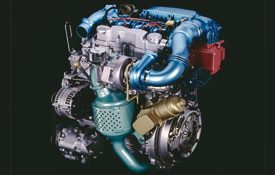 PSA automotive brands Peugeot and Citroen have now built over 10 million vehicles powered by their HDi diesel engines. They've reached that threshold in only nine years. HDi is Peugeot's nomenclature for their common rail diesel injection system. The prevalence of diesels in their lineup have made Peugeot and Citroen the lowest CO2 emitters in Europe with an average of 140g/km for 2006.
PSA automotive brands Peugeot and Citroen have now built over 10 million vehicles powered by their HDi diesel engines. They've reached that threshold in only nine years. HDi is Peugeot's nomenclature for their common rail diesel injection system. The prevalence of diesels in their lineup have made Peugeot and Citroen the lowest CO2 emitters in Europe with an average of 140g/km for 2006.
Peugeot has applied the common rail technology to engines ranging from their 55hp, 1.4-liter 4-cylinder to the 205hp, 2.7-liter V-6. The HDi engines are twenty percent more efficient than the previous generation diesels and thirty percent better than similar displacement gas engines. The Peugeot press release is after the jump.
[Source: Peugeot]
PSA Peugeot Citroën's HDi Diesel Engine Production Tops the 10-Million Mark
PSA Peugeot Citroën has now produced more than 10 million vehicles equipped with the HDi engine, a key factor in reducing CO2 emissions.
Coming less than a decade after the Group introduced HDi technology in 1998, this success validates its commitment to high-volume production of modern diesel engines that offer superior environmental performance, driveability and fuel efficiency.
The HDi has enabled PSA Peugeot Citroën to maintain and expand its leadership in diesel engine technology and to outpace the fast growth in diesel sales in Europe over the past ten years.
It has also helped make the Group the European leader in CO2 emissions control.
An extensive, aligned offering
Deployment of common-rail technology across the Peugeot and Citroën model base has enabled the development of a diverse array of high-tech diesels, ranging from the 55hp, 1.4-liter 4-cylinder engine to the 205hp, 2.7-liter V6. The lineup comprises eight passenger car versions, steadily gaining in power in 14 to 34 hp increments.
The HDi's "Magic Square"
The success of the HDi engine stems from its alignment with both customer demand and the growing environmental consciousness of modern society. HDi-powered cars deliver properties symbolized by a "magic square" of fuel efficiency, driveability, quiet ride and clean running.
Leveraging their recognized expertise in diesel technology to develop the HDi, PSA Peugeot Citroën's engineers have achieved unprecedented performance levels in terms of driveability, quiet ride and environmental footprint.
The HDi: an environmentally, socially responsible engine
The HDi reduces fuel consumption and CO2 emissions by 20% compared with the previous generation of prechamber diesels and by 30% compared with a same-size gasoline engine.
More efficient management of the combustion process provided by common rail technology has reduced carbon monoxide emissions by 40%, unburned hydrocarbons by 50% and engine particulates by 60%.
HDi technology has also enabled the Group's engineers to develop the world's first FAP® particulate filter, which is gradually being fitted to almost all of the Peugeot and Citroën HDi models.
Significant additional reductions in fuel consumption and emissions are still possible thanks to the HDi's potential for further improvements.
A major contributor to PSA Peugeot Citroën's performance in reducing fuel consumption and CO2 emissions
The widespread deployment of HDi technology across the Peugeot and Citroën lineups and the engine's demonstrated success with customers have helped propel the Group to leadership in energy-efficient vehicles and enabled it to achieve the best environmental performance in the market, both in France and elsewhere in Europe.
For the second year in a row, PSA Peugeot Citroën headed the list prepared by the French Agency for Environment and Energy Management (ADEME) that ranks carmakers in terms of CO2 emissions. With a 2006 corporate new car average of 140 g/km, the Group had the lowest emissions of any automobile manufacturer in the French market.
HDi: a success that creates high-quality jobs
HDi engines are produced in the Group's plants in Trémery in eastern France and Douvrin in northern France, as part of a cooperation agreement with Ford Motor Company. Thanks to the popularity of the engines and the expert skills of their production teams, both plants are world-class centers of excellence.


Sign in to post
Please sign in to leave a comment.
Continue